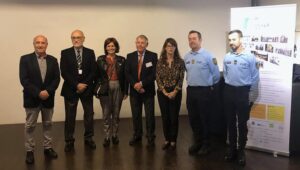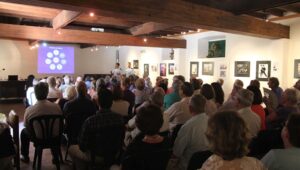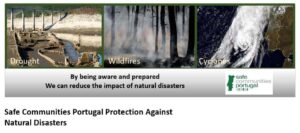By David Thomas
One of the best slogans I have come across for many years was from Captain Adriano, Commander of the GNR Loulé, who during a recent presentation to Loulé residents stated:
“Your next door neighbour is your nearest policeman.”
Of course what he was eloquently referring to is the fact that, if neighbours watch out for each other and keep an eye open for suspicious activities, everyone would be safer. A great statement!
This feature therefore deals with the role of the community in support of the police and how community policing here in the Algarve can help prevent crime. This is in fact one of the aims of Safe Communities Algarve – to draw people together to reduce crime.
The evolvement of community policing
Community policing has gradually evolved in different styles over the years but has not always been successful. One of the earliest police forces to adopt this was the Japanese police using what was called the “Koban” system. I had the pleasure to visit Tokyo and study this system in the early 1990s. Basically, this system involved the creation of a network of small police posts in towns where people made reports of crime and could go there for advice on many matters not always police-related.
Police provided foot patrols in the vicinity of each of these posts and visited all residents at their homes in a certain radius of the post. The purpose of the visits was to check that people were safe, that their homes were secure and provided an opportunity to deal with any questions they wished to raise. This was an excellent model of community policing, but extremely manpower intensive and not sustainable without considerable resources.
However, for many people from the UK they associate community policing with the 1950s/60s TV series Dixon of Dock Green, where officers on foot patrol really engaged with the public.
However, in the 1970s and 80s things changed when police gradually withdrew foot patrols and used mobile patrols in cars instead. This single move meant that police became detached from the community, which resulted in less engagement and tragic consequences in some areas. In more recent years, the police have tried to return to a more community-based policing in the form of using community support officers with mixed success.
In the 1970s in Hong Kong where I worked, the Royal Hong Kong Police developed the Neighbourhood Police Office system where dedicated units of police worked in large housing estates with a police office located in the estate.
Unfortunately, this was extremely manpower intensive and because of this the system was discontinued. However, Hong Kong, with its small size and comparatively large police force, still places considerable emphasis on foot patrols and close community engagement.
Portuguese model of proximity policing
In Portugal, community policing is more commonly referred to as “proximity policing”, which is an integrated policy for the prevention and containment of crime. It incorporates the following actions:
• Firstly, strengthening partnerships with local government agencies, local authorities and civil society, including NGOs, private sector, foundations, corporations and others, aimed at a more effective approach to the specific needs of each community;
• Secondly, coordinating effective joint action with all bodies/institutions of the Ministry of Internal Affairs through the implementation of various programmes and
• Thirdly, fostering accountability and
citizen participation.
The model is based on a proximity policing philosophy and organisational strategy that allows the National Guard (GNR) to work together with the community, in order to arrive at mutual satisfaction to solving the problems of society; in other words a problem-solving approach.
There are two main strategies: developing and implementing new forms of organisation, and new techniques of police proximity and visibility in the daily relationship between the guard and the citizen; and secondly establishing specific programmes focused on specific problems and those in which social groups are most vulnerable
These programmes are aimed at various sectors and vulnerable social groups such as: Safe Elderly, Safe Schools, Safe Commerce and of course the Safe Residence Programme (SRP). There are a number of components for each programme aimed at public awareness and crime prevention.
Public role in community policing
“It takes two to Tango” and clearly the police cannot undertake community policing without the involvement of the community. Traditional thinking in Portugal has been that anything to do with keeping communities safe rests solely with the police.
In the past, most criminals were locals and there was very little serious crime. However, over the past decade crime patterns have changed with the unfortunate emergence of violent crimes, such as indoor residential robberies, which are often committed by those from Eastern Europe, Africa and South America.
As a result, public support in crime prevention has become more important. The GNR Safe Residence Programme (SRP), created in January 2010 in response to such crime, was therefore a major step forward in engaging the community.
One of the benefits of the SRP has been the bringing together of residents and villages in terms of creating greater awareness of crime and how in many cases people can contribute to reducing the chances of becoming a victim of crime. The SRP meetings with residents at the forming of the programme provide an ideal opportunity to learn more about the work of the GNR and their role in helping them.
Safe Communities Algarve was therefore formed a year ago to supplement the work of the police in engaging with the foreign community in particular. It has filled a void which previously existed and has been well supported by both the GNR and PSP.
Recently, it was registered as an association, becoming the first association in Portugal dedicated to crime prevention. As such it has an important role in helping communicate public aspirations as well as concerns to the police and help the police explain their roles more fully to the public.
In 2012, Safe Communities Algarve, together with the GNR and PSP, embarked on a series of crime prevention seminars and these have proved extremely popular.
Very recently, SCA and the GNR held a joint event promoting the GNR Safe Commerce programme and providing crime advice to residents related to the type of crime that occurs over the Christmas and New Year period.
These seminars and events will continue throughout 2013. If there is a group of you that would like to benefit from such events in your area, please let me know.
However, you do not have to be in a group to help prevent crime. Each of us has a role to play by understanding the nature of crime; how we can help keep both ourselves and our neighbours safe through adopting simple measures and of course reporting suspicious activities. By doing this we can all contribute to safe communities in some way.
May I wish all readers a very happy and safe New Year and a warm thank you for your support during 2012.
||features@algarveresident.com
David Thomas is a former Assistant Commissioner of the Hong Kong Police, consultant to INTERPOL and the United Nations Office on Drugs and Crime. In October 2011 he formed Safe Communities Algarve an on-line platform here in the Algarve to help the authorities and the community prevent crime. 913 045 093
























